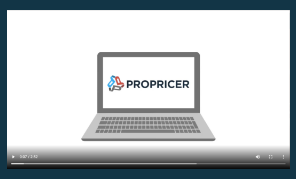It’s safe to say there’s never been a more rewarding time to participate in government contracting. Nearly $146 billion in federal contracting dollars were awarded to small businesses in 2021—and we’re bound to see just as much potential in the new year. (2) Contracts can open doors to unprecedented levels of growth for many small businesses.
That said, the world of government contracting is also extremely competitive. You need to be on your A game if you’re going to stand out and win the deal. Mistakes can cost you time and money—and you simply can’t afford to make them. (1)
For the best chances of securing the bid, make sure to avoid these common mistakes.
Mistake #1. Thinking you don’t need to have experience in all areas an RFP specifies
At times, job applicants in the commercial sector have been known to get away with overstating their qualifications for a position. This isn’t the case with government contracting. The government will want to see that either your firm or your partner has concrete past experience in all required fields. If you over-exaggerate your abilities or gloss over requirements, you risk damaging future opportunities to secure proposals.
As you and your team review the Request for Proposal (RFP), make sure you thoroughly evaluate all the requirements. If you discover you haven’t met one or more conditions, consider finding a subcontractor or teaming partner with relevant experience. (3)
Mistake #2. Buying GSA Schedules that you can’t comprehend
The GSA Schedule can be a gateway to new opportunities and potential customers, but that doesn’t mean you should automatically jump the gun. For starters, getting onto the GSA Schedule is time-consuming and expensive.
You’ll spend hours preparing the correct documentation, and then you’ll still have to compete for opportunities the same way you would on the open market. Plus, not every agency uses the GSA Schedule—it’s possible your target audience isn’t even on there.
It’s better to hold off on the GSA Schedule until you’ve racked up enough experience and you’ve verified that your customers are using it. To look at an example GSA schedule, check out ProPricer’s here. (1)
Mistake #3. Not using sales skills in contract negotiations
Some entrepreneurial leaders are product-focused, others are skilled in management, and others are highly technical. A very small portion is excellent at sales. However, when it’s time to negotiate a contract, it’s critical to put people in front of an agency who have a sales skill set. As a business owner, you have to develop your company’s narrative, brush up on your pitch, and emphasize your solution’s strongest points as an ideal solution.
Though you can always hire skilled salespeople to do the heavy lifting, you’ll still need to show face now and then—so it’s best to be prepared. (4)
Mistake #4. Capturing leads randomly or sporadically
For most other industries, it’s common knowledge that business development is a numbers game. Typically, the goal is to send out a host of pitches in the hopes that a couple will stick. Unfortunately, this approach doesn’t exactly translate to the world of government contracting.
If your business is looking to secure fairly straightforward contracts that don’t require a ton of complexity, volume may be a sound strategy.
However, if you’re offering more specialized products or services, or if you’re competing for more complicated contracts, you’ll be better off honing in on a couple of proposals at a time. Try to select the proposals you believe you’d have the best chances of securing and focus accordingly. (1) For an enlightening perspective on this, watch our on-demand webinar “The GovCon Gold in Contract Data,” here.
Mistake #5. Trying to be a “jack of all trades”
It’s tempting to want to be something to everyone. You might even think that spreading yourself thin would help you land more contracts and secure more business—but this couldn’t be further from the truth.
As a small business, you’re stronger when you excel in a specific niche. This gives you expertise in your field which allows you to stand out from the competition. Instead of being a generalist, focus on developing your specialty and finding customers that need your solutions. (1)
Mistake #6. Not understanding how agencies buy
After you’ve honed in on your specific field, it’s time to identify which agencies would benefit the most from what you have to offer. As you do your research, you want to pay particular attention to how each prospect finds the companies they work with.
There’s no standard method among agencies for finding businesses. Some may use the GSA Schedule, some may not. It may also be worthwhile to register on other databases, such as the Central Contractor Registry, the Dynamic Small Business Search (DSBS), and beta.SAM.gov.
Set-aside programs can also be a beneficial resource. Whichever it is, make sure you’re in the place where your target market can find you. (1)
Mistake #7. Not reading through the fine print
Agencies are notorious for imposing strict requirements on small businesses, making it imperative that you read through each contract you’re serious about.
Most importantly, make a list of all the eligibility criteria, certification requirements, and other demands you’ll need to meet. This will help you save time and allow you to focus only on the proposals you have the best chances of winning.
Mistake #8. Not knowing what sets you apart from the competition
Any business can boast about its credentials and relate to an agency’s mission. To really stand out from the competition you need to identify the characteristics that make you different from everyone else. Consider what makes you a leader in your space and put those details at the forefront of your proposal (1)
Mistake #9. Believing that agencies don’t look at resumes submitted with a proposal
Resumes help agencies understand your staff’s previous experiences and capacity to effectively perform. Don’t assume that agencies will only look into your business’ credentials and gloss over individual team member qualifications. Instead, take the time to prepare the resumes of key employees involved in the proposal.
Resumes should match the requirements of the RFP while also highlighting your strongest selling points. Think of resumes as an additional supplement to really drive your sales message home. (3)
Mistake #10. Submitting proposals in a format not optimized for agencies
Trying to format your proposal in Excel is time-consuming, confusing, and at worst—makes you appear sloppy. Agencies have a standard preferred format for proposals and it’s not recommended to deviate from the norm. Instead, opt to deliver clear-cut, professional proposals with ProPricer Essentials.
ProPricer Essentials is the must-have software for automatically generating proposals in the correct government format. It’s also the most efficient way to negotiate pricing positions, analyze what-if scenarios, manage data, and more—all in one place. The best part? It’s free.
Learn more about ProPricer Essentials here. And while you’re at it, check out another of our on-demand webinars, “How ProPricer Can Increase Your Profits,” here.
Sources
- Georgia Tech Enterprise Innovation Institute: Want to win government contracts?
- SBA Press Release: Federal Government Awards Record-Breaking Contract Amount to Small Businesses
- KSI Article: 3 Errors to Avoid When Submitting as a Small-Business Prime
- . Business Insider Article: Government Contracts Can Be a Lifeline for Small Businesses





